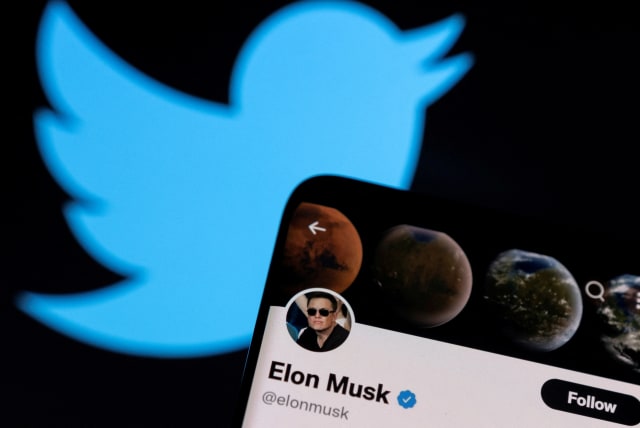Antisemitism on Twitter more than doubled since Musk takeover - study

The weekly average number of antisemitic Tweets increased by 106% (from 6,204 to 12,762) from before Musk's acquisition to after.
Antisemitic posts spiked on Twitter during its takeover by Elon Musk and have since remained on an elevated level, according to research done by tech firm CASM Technology and the London-based think tank Institute for Strategic Dialogue.
The analysts detected a total of 325,739 English-language antisemitic Tweets in the nine months from June 2022 to February 2023, with the weekly average number of antisemitic Tweets increasing by 106% (from 6,204 to 12,762) from before the acquisition to after. Elon Musk completed his takeover of the firm on October 27.
The creation of accounts that went on to publish antisemitic content rose as well, with 3,855 such accounts being created between October 27 and November 6, an increase of 223% compared to the 11 days (the equivalent timespan) leading up to October 27.
Elon Musk's changing approach to dealing with online hate
Musk has described himself as a "free-speech absolutist". This philosophy has had a significant influence on the changing nature of Twitter and its policies. Upon acquiring the company, Musk oversaw the Independent Security Trust and Safety Council's dissolution and returned many accounts that had previously been banned. For example, Donald Trump and Andrew Tate's accounts were returned, stirring controversy.
Musk had claimed that “hate Tweets will be max deboosted,” but the data showed only a small decrease in the average levels of engagement or interaction with antisemitic tweets before and after the takeover.
The research showed that after Musk’s takeover, despite promises that hate would be deboosted, few changes were made in the reach and interactions that the tweets had.
Around 12% of the plausibly antisemitic messages that were identified by analysts are now inaccessible on the platform, compared to roughly 6% versus pre-takeover.
However, moderation efforts are not keeping up with the increased volume of hateful content on the platform and accordingly have limited impact - a finding affirmed by recent research by the ADL which showed the low removal rate of flagged antisemitic Tweets.
The researchers used an algorithmic architecture to identify Tweets that could be interpreted as ‘plausibly antisemitic,’ meaning at least one reasonable interpretation of a message’s meaning fell within the International Holocaust Remembrance Alliance’s definition of antisemitism.
This method was evaluated to operate at a 76% accuracy in identifying antisemitic tweets.
Themes of antisemitism on Twitter
The analysts also described the main themes appearing in the antisemitic posts. Among the themes was conspiracist content alleging Jewish control of 'elites,' media and politics. Related to this are attacks on states seen as under 'Zionist control,' mainly Israel and Ukraine. These tweets often alleged that George Soros had used to influence the Democratic party in the United States.
Researchers noted the words 'goy' and 'goyim' is increasingly used to describe the non-Jewish victims of imaged Jewish conspiracies. 'Goy' or 'goyim' is a Yiddish term, directly translated to mean 'nations' that has come to refer to non-Jews.
There was also an increase in the antisemitic slur 'k*ke' appearing in tweets.
Researchers also found a lot of tweets expressing support for antisemitic comments made by Kanye West.
Two 'classic' antisemitic themes made their appearance as well. One of them is racialized antisemitism, which the study defined to include white nationalism, nativism, and ethno-supremacism.
Finally, antisemitic posts recycled historical tropes, which include the attempt to separate historical ‘races’ of ‘fake’ and ‘real’ Jews and the blaming of Jews for the death of Jesus. The term 'synagogue of satan' was repeatedly used to describe the conspiracy where the Jewish people stole the identity of Black people.
The theme of antisemitic tweets changed depending on current events. In August, after rocket exchanges between Israel and Gaza, tweets attacking Jews for Israel became the most frequently tweeted. In October, after brands dropped Kanye West, his brand of antisemitism became the most frequently tweeted.
Jerusalem Post Store
`; document.getElementById("linkPremium").innerHTML = cont; var divWithLink = document.getElementById("premium-link"); if (divWithLink !== null && divWithLink !== 'undefined') { divWithLink.style.border = "solid 1px #cb0f3e"; divWithLink.style.textAlign = "center"; divWithLink.style.marginBottom = "15px"; divWithLink.style.marginTop = "15px"; divWithLink.style.width = "100%"; divWithLink.style.backgroundColor = "#122952"; divWithLink.style.color = "#ffffff"; divWithLink.style.lineHeight = "1.5"; } } (function (v, i) { });

